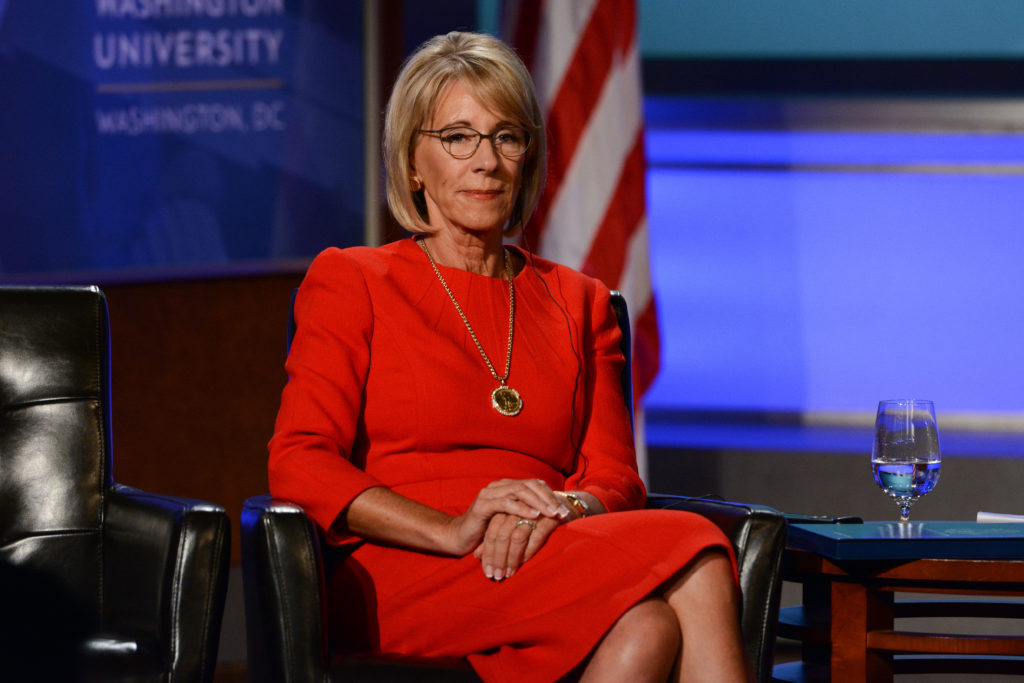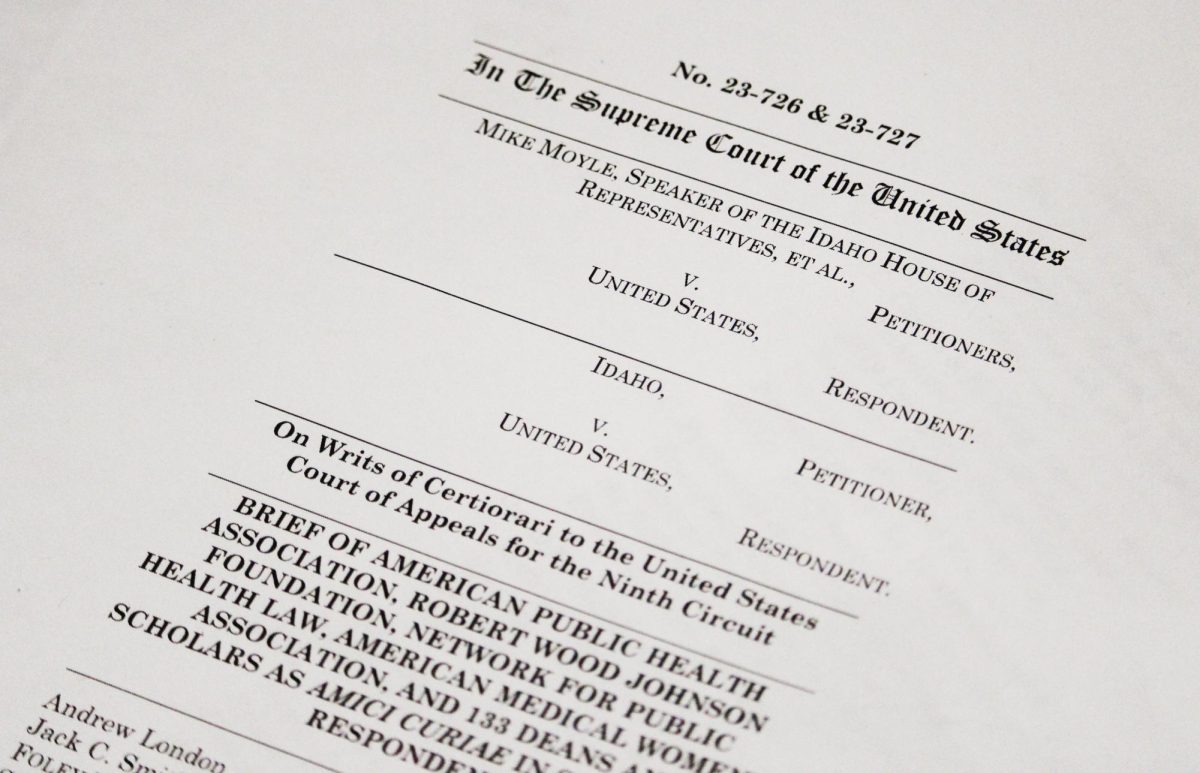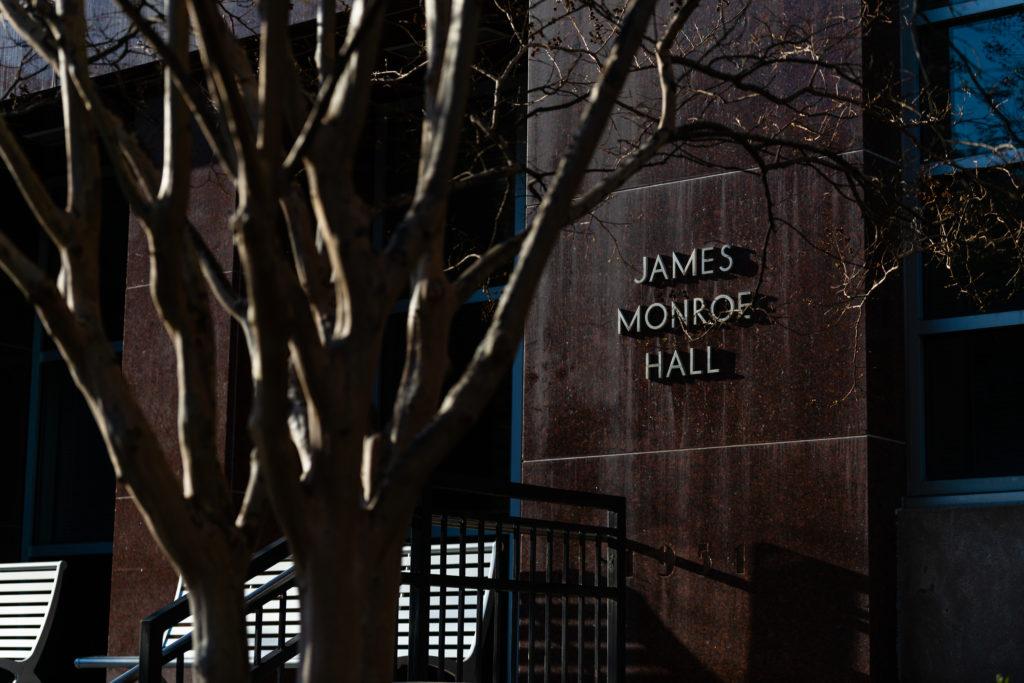Betsy DeVos is leaving behind a controversial legacy in higher education after nearly four years leading the U.S. Department of Education.
Since assuming the role of Secretary of Education, DeVos altered campus sexual assault policies to give more rights to assailants and accelerated the Office for Civil Rights’ process for resolving complaints. DeVos’ confirmation to the Cabinet was one of the most polarizing in American history, and Vice President Mike Pence was forced to cast the first-ever tie-breaking vote for a Cabinet nomination to secure President Donald Trump’s pick.
DeVos resigned in protest from her position in the Cabinet Jan. 7, citing the riot and insurrection at the Capitol the day before as the reason in a letter to Trump.
Liberal-leaning political figures and educational advocates often criticized DeVos’ leadership, leading public figures, like Sen. Elizabeth Warren, D-Mass., to criticize her tenure on social media after she announced her resignation. When news of DeVos’ resignation broke, the American Federation of Teachers, the country’s second-largest teacher’s labor union, released a two-word statement: “Good riddance.”
Caroline Laguerre-Brown, the vice provost for diversity, equity and community engagement, said the University will lawfully implement the ED’s policies regardless of who is leading the department.
“Sexual harassment policy changes necessitated by the Department of Education’s new Title IX regulations were implemented in August 2020, during a time when most of the campus was closed due to the COVID 19 pandemic,” she said in an email. “It is too early to tell what the impact of the new regulations may have on reports or complaints of sexual harassment.”
Laguerre-Brown said students can still approach Title IX officials for support in dealing with sexual assault, even if they don’t wish to move forward with a formal complaint.
“These supportive measures include consultation with Christina Franzino, the assistant director for sexual assault prevention and response, referrals for counseling or medical care, academic support, mutual no-contact orders, housing support and referrals to community resources,” she said.
She declined to say how GW’s relationship with the education department has changed since DeVos took office. She declined to say how DeVos’ policies affected the way GW handles OCR complaints.
Title IX reform
One of DeVos’ central policies, as well as one of the most controversial, was Title IX sexual harassment regulations that went into effect in August of last year, narrowing the definition of sexual harassment and overhauling the sexual assault reporting process. In a letter to Congress, DeVos wrote that the rule “strengthens protections for survivors of sexual misconduct and restores due process.”
Marissa Pollick, a Title IX lawyer and lecturer of sports management at the University of Michigan, said the new rule grants more rights to accused perpetrators than they were given during then-President Barack Obama’s administration.
Pollick said the new regulations created a “higher standard of proof” for finding the accused responsible. She said survivor advocates are concerned that the new rule may undermine attempts to find the perpetrators of sexual harassment.
“They’re concerned that those rules actually discourage victims from coming forward,” Pollick said. “They make it more difficult for complainants to file and pursue claims.”
Unlike the Obama-era guidelines, which did not carry the force of law, DeVos’ regulations went through a “lengthy” public review process and carry the weight of the law, Pollick said. She said the administrative rulemaking process DeVos underwent could make the rule more difficult for President-elect Joe Biden’s administration to potentially overturn.
“The sexual harassment and sexual assault guidance under Title IX was just that – it was simply guidance that’s issued through the Office for Civil Rights,” Pollick said. “What the DeVos and Trump administration did was actually issue formal regulations, which is a more complicated federal process and makes it more difficult to overturn them.”
In a statement provided to The Hatchet, an ED spokesperson defended the rule from critics, saying it “protects” students.
“Secretary DeVos spearheaded the creation of a fair, reliable and legally-binding Title IX rule that protects all students at both the K-12 and postsecondary levels,” the spokesperson said. “The Title IX rule has earned praise from both sides of the political aisle and has withstood every single legal challenge it has faced.”
Federal student loan freeze
The department announced in March, as the COVID-19 pandemic reached D.C., that the federal government would freeze payments for federal student loan borrowers, which were repeatedly extended by the Trump administration until at least the end of this month.
Scott Buchanan – the executive director of the Student Loan Servicing Alliance, an association of student loan servicers – said the unpredictability and sudden arrival of the pandemic had the potential for an “unprecedented” economic impact on borrowers, making relief necessary.
“There was so much uncertainty about who might be impacted, what the level of that impact would be,” Buchanan said.
Student loan debt accounts for nearly 40 percent of the debt held by Americans ages 18 to 29, and Americans currently hold nearly $1.6 trillion in student loan debt in aggregate, according to the Federal Reserve Bank of New York. Biden’s incoming administration is expected to extend the student loan payment freeze past its current end date of Jan. 31.
An ED spokesperson called DeVos’ response to the COVID-19 pandemic “fast and decisive,” citing the freeze of student loan payments and money allocated to schools through the CARES Act.
“She granted an administrative forbearance for federal student loans and set their interest rate to zero and made $13 billion in CARES Act funding available to states, districts and institutions very quickly,” the spokesperson said.
The spokesperson declined to say whether the current administration will recommend to the new ED leadership to extend the federal loan halt. They declined to describe the relationship between higher education administrators and the ED leadership.
Office for Civil Rights
Under DeVos’ leadership, the Office for Civil Rights closed more than 1,200 civil rights investigations that it inherited from the Obama administration, without any findings of wrongdoing or corrective action. The office under DeVos was 16 percent less likely to side with the complainant when compared to decisions made under Obama.
The ED spokesperson said under DeVos’ leadership, the department addressed a backlog in OCR complaints, closing 6,431 of the 7,854 cases left from the Obama administration.
“Under the secretary’s leadership, the Office for Civil Rights completed its largest-ever investigation into systemic sexual assault problems in a major public school system and launched over 700 proactive investigations in two national initiatives focused on students with disabilities,” they said.
Liz King, the director of education policy at The Leadership Conference on Civil and Human Rights, said OCR was focusing on closing cases quickly instead of on the cases themselves, creating the possibility that investigators didn’t have time to conduct a fair investigation.
King said changes to the Case Processing Manual, the document that guides the work of civil rights investigators, “removed an expectation” that OCR investigates all relevant information in civil rights cases.
“What we have heard from Secretary DeVos is a focus on the speed with which complaints were resolved,” King said. “We would never seek to delay the provision of justice, but we know that speed is only one measure of whether justice is served.”
King said DeVos’ actions resulted in a lack of trust between students and Title IX administrators that are supposed to protect them from discrimination, but she hopes that can be fixed under Biden.
“What students in both higher education and in K-12 schools saw was a secretary of education who was willing to disregard their needs to allow for their discrimination and allow for their exclusion,” King said.







